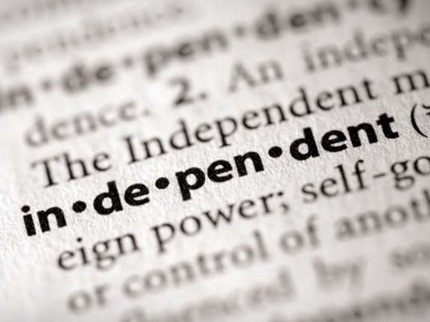Independent Voters and The Legacy of 1776

In the midst of Independence Day fireworks, picnics, and barbecues earlier this week, our culture celebrated our political system. Our Founding Fathers made us free, so we celebrate our current system of democracy. The implication is that the system we have now is what the Founders envisioned, and-- by corollary-- that those who are critical of the system are unpatriotic. The fact is that our current system is not what the men who authored the Declaration of Independence had in mind, and that independent voters are following the true legacy of 1776.
In the years leading up to the American Revolution the colonists were faced with a choice: Work within the system of tyranny from afar, or take charge of their own destiny by charting a new course. For several years, leaders tried everything they could to work within the system, sending petitions to Great Britain again and again. Their desperate attempts are recorded after the list of abuses in the Declaration of Independence:
"In every stage of these Oppressions We have Petitioned for Redress in the most humble terms: Our repeated Petitions have been answered only by repeated injury."
When attempts to work within the system failed, activists across the colonies decided to work outside the system. They declared to the world that they were their own masters, not subject to the control of a foreign power. They boldly declared that they would be taking control of their own destiny and no longer bowing to the establishment:
"We, therefore, the Representatives of the united States of America, in General Congress, Assembled, appealing to the Supreme Judge of the world for the rectitude of our intentions, do, in the Name, and by Authority of the good People of these Colonies, solemnly publish and declare, That these United Colonies are, and of Right ought to be Free and Independent States..."
This is the model of 1776: Work within the system until it becomes obvious that the system is broken, then declare your independence and use alternative methods to fight the tyranny of the establishment.
Independent voters are following in the footsteps of the statesmen we honored on Independence Day. The independent voter sees through the two-party system, realizing that in the end both parties are offering the same failed policies: policies that have given us endless war, endless corporate bailouts and handouts, and partisan bickering over issues that do not matter. For years, many now independent voters worked within this two-party system, faithfully voting and then feeling victimized when their party's candidate continued the failed policies of previous administrations. They could echo the words of the Declaration of Independence:
"We have appealed to their native justice and magnanimity, and we have conjured them by the ties of our common kindred to disavow these usurpations... They too have been deaf to the voice of justice and of consanguinity."
Eventually, these voters reached a tipping point, realizing that working within the system wasn't working, and that real change was needed. Independence is not just a political strategy. It is a way of life. It means declaring that you will no longer depend on others for your views, or be confined to only two choices. Instead, you will assert your ideological independence. John Quincy Adams expressed this independence in his advice on voting:
"Always vote for principle, though you may vote alone, and you may cherish the sweetest reflection that your vote is never lost."
The men who helped create the Constitution did not want a system in which parties would fight each other. They wanted a government that would fight injustice and defend the rights of the people. George Washington warned about "the spirit of party" in his Farewell Address:
"They serve to organize faction, to give it an artificial and extraordinary force; to put, in the place of the delegated will of the nation the will of a party, often a small but artful and enterprising minority of the community; and, according to the alternate triumphs of different parties, to make the public administration the mirror of the ill-concerted and incongruous projects of faction, rather than the organ of consistent and wholesome plans digested by common counsels and modified by mutual interests."
In their rebellion against the political establishment of our partisan system, independent voters mirror the literal rebellion of the American revolutionaries against British tyranny. This revolution is not conducted with violence, and it is not necessarily conducted with votes. It is begun anew every time an individual declares independence from a party and decides to be ideologically independent. From that point, voting is only one tool of achieving change. More powerful are the simple interactions with the people we meet in our daily lives. The Declaration of Independence began by recognizing the independence of the individual, and it is the independent mind that has made our nation great:
"We hold these truths to be self-evident, that all men are created equal, that they are endowed by their Creator with certain unalienable Rights, that among these are Life, Liberty and the pursuit of Happiness."
In their pursuit of life, liberty, and happiness, independent voters, thinkers, and activists have truly grasped the spirit of '76.




